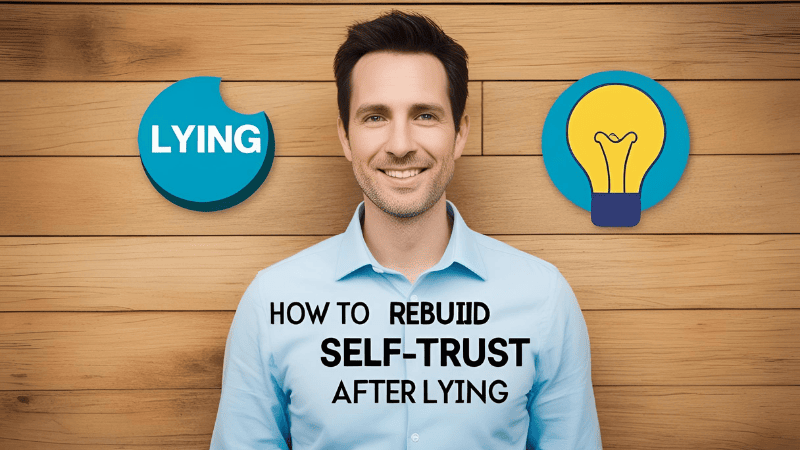How to Rebuild Trust After Lying can feel like an impossible task, especially when the hurt runs deep. Have you ever told a lie—big or small—only to watch it shatter a relationship? Maybe it was a broken promise to a friend, a hidden truth from a partner, or a misstep at work that made your colleagues question your integrity.
In that moment, you realize trust isn’t just given—it’s built over time, and one mistake can bring it all crashing down. But does that mean it’s gone forever? Not necessarily.
Rebuilding trust after a lie takes time, effort, and emotional clarity. Often, people find themselves overthinking every detail of the situation, especially after a relationship setback. If you’re constantly stuck in a loop of negative thoughts, it’s crucial to address that mental pattern. Learn how to stop overthinking after a breakup and take the first step toward emotional healing and rebuilding your inner peace.
Rebuilding trust is challenging, but with honesty, consistency, and patience, it’s possible to repair the damage and even strengthen your relationship in the process. This guide will walk you through the steps to regain trust, mend relationships, and prove—through actions, not just words—that you are committed to making things right.
Why Lying Destroys Trust (Psychological Impact)
Trust Is Like a Broken Mirror
How to Rebuild Trust After Lying isn’t just about saying “I’m sorry” and moving on—it’s about repairing something fragile. Trust is like a mirror; once it’s broken, even if you fix it, the cracks remain. Even a small lie can shake the foundation of a relationship, leaving behind doubt, insecurity, and emotional pain that lingers long after the truth is revealed.
How Lies Affect Relationships
Whether it’s in a romantic relationship, a friendship, or the workplace, dishonesty creates a ripple effect. A single lie can make the other person question everything they once believed about you. It weakens emotional bonds, making genuine connection and communication difficult. Restoring trust in a relationship takes much more effort than building it in the first place.
Common Reactions to Being Lied To
When trust is broken, the most common responses are anger, disappointment, and a loss of emotional safety. The person who was deceived may become withdrawn, constantly second-guessing your words and actions. The worst part? Once someone has been lied to, they often start searching for signs of dishonesty in every interaction—even when you’re telling the truth.
The Path to Healing
Rebuilding trust means understanding the depth of this emotional impact and taking conscious steps to show through honesty, transparency, and consistency that you’re committed to making things right. Trust isn’t restored overnight, but with patience and genuine effort, it is possible to mend the cracks and move forward.
Sometimes, despite efforts to rebuild trust, a relationship reaches a point where separation feels like the healthiest option for both partners. If you’re considering this difficult decision, it’s important to approach the conversation with clarity and empathy. Here’s how to ask for a divorce and tell your husband about separation in the most respectful and honest way.
Step-by-Step Guide: How to Rebuild Trust After Lying
Rebuilding trust after deception isn’t just about apologizing—it’s about proving your commitment through honesty, accountability, and consistent actions. How to Rebuild Trust After Lying requires patience and a step-by-step approach to mend the emotional wounds caused by dishonesty. Follow these steps to regain credibility and restore your relationship.
Step 1: Admit the Truth & Take Responsibility
Trying to justify or downplay a lie only deepens the hurt, betrayal, and disappointment felt by the other person. If you want to rebuild trust, you must own up to your actions completely. Taking responsibility shows maturity, emotional intelligence, and genuine remorse. Instead of making excuses, be direct and acknowledge the pain you caused.
🔹 Example Dialogue: “I know I hurt you by lying, and I take full responsibility for it.”
💡 Key Insight: People are more willing to forgive when they see that you truly understand the impact of your actions.
Step 2: Apologize Sincerely (Words That Work)
A fake apology like “I’m sorry if you feel hurt” will only make things worse. A real apology includes three essential elements:

✔️ Regret – “I deeply regret lying to you.”
✔️ Responsibility – “I take full accountability for my actions.”
✔️ Remedy – “Here’s what I will do to ensure this never happens again.”
💡 Pro Tip: Write your apology down first—it helps you express your feelings more clearly and sincerely.
Trust issues often arise after one partner engages in dishonest behavior, such as infidelity. Understanding the signs and patterns that lead to betrayal can help in the healing process and prevent future mistakes. If you’re curious about the behavioral changes that may occur during such times, read about the things women do when they cheat on their partner to gain deeper insight.
Step 3: Be Completely Honest & Transparent
Hiding details—even small ones—will only make the situation worse. The person you hurt may develop trust issues, feel emotionally unsafe, and doubt your intentions moving forward. The best way to rebuild trust is to commit to radical honesty, even when it’s uncomfortable.
🔹 Instead of: “I didn’t think it was a big deal.”
🔹 Say: “I know my actions hurt you, and I want to be fully honest moving forward.”
💡 Why It Matters: Rebuilding trust means rebuilding emotional safety. Transparency reassures the other person that they don’t have to question your words anymore.
Step 4: Give the Other Person Time to Heal
How long does it take to rebuild trust after lying? There’s no set timeline—it depends on the severity of the betrayal, the history of the relationship, and the other person’s emotional capacity.
⏳ Signs They’re Starting to Trust You Again:
✅ They engage in deeper conversations.
✅ They stop bringing up the lie repeatedly.
✅ They rely on you for emotional or practical support.
💡 What NOT to Do: Don’t push for immediate forgiveness. Forced forgiveness can lead to resentment. Instead, focus on showing change through your actions.
Step 5: Show Consistency in Words & Actions
🔥 Golden Rule: Trust is rebuilt through small, consistent efforts over time.
Your words mean nothing if your actions don’t align. Keeping even the smallest promises proves that you are committed to change.
🔹 Example: If you promise to be home by 8 PM, be home by 8 PM—no excuses.
💡 Why It Matters: The more you show integrity, reliability, and emotional maturity, the stronger the foundation of trust becomes.
Step 6: Improve Communication & Set Boundaries
One of the best ways to prevent future lies is to create a space where honest conversations feel safe. Set clear expectations for the relationship and practice active listening.
🔹 Ways to Improve Communication:
✅ Be honest about your feelings and intentions.
✅ Validate the other person’s emotions.
✅ Ask open-ended questions to encourage deeper discussions.
💡 Insight: How to Rebuild Trust After Lying isn’t just about fixing the past—it’s about building a healthier, more open relationship for the future.
Step 7: Consider Professional Help If Needed
In some cases, trust issues run deep, and repairing the damage may require external guidance. If the betrayal has caused significant emotional distress, therapy or relationship coaching can help.
🔹 When to Seek Professional Help:
✅ If the other person struggles to move past the betrayal.
✅ If you notice recurring patterns of dishonesty in your behavior.
✅ If communication feels impossible despite your efforts.
💡 Why It’s Beneficial: A professional can help you understand emotional triggers, develop healthier habits, and rebuild trust in a structured way.
Final Thoughts
How to Rebuild Trust After Lying takes time, patience, and genuine effort. Apologies alone won’t heal the damage—you must prove through your actions that you’ve changed. Whether it’s a romantic partner, a close friend, or a colleague, trust can be restored when honesty, accountability, and emotional safety are prioritized. Stay consistent, be patient, and focus on building a relationship that is stronger than before.
How to Rebuild Self-Trust After Lying
Lying doesn’t just damage relationships with others—it also shatters your own self-trust. The guilt, shame, and disappointment that follow can make you question your integrity and self-worth.

How to Rebuild Trust After Lying isn’t just about making things right with others; it’s about learning to trust yourself again. When dishonesty becomes a pattern, it erodes your confidence in your own values, decision-making, and moral compass. Rebuilding self-trust means recognizing your mistakes, holding yourself accountable, and making a conscious effort to be honest—not just with others, but with yourself.
Forgiving Yourself: The First Step
Sometimes, the hardest part of How to Rebuild Trust After Lying is forgiving yourself. You might replay the lie over and over in your mind, feeling like a fraud. But dwelling on guilt won’t change the past. The key is to acknowledge the mistake, learn from it, and commit to personal integrity moving forward.
💡 Practical Step: Write yourself a forgiveness letter, acknowledging what you did, expressing regret, and setting an intention to change.
How Lying Damages Your Self-Image
Lies create an internal conflict—on the outside, you may act like nothing happened, but inside, you feel disconnected from your true self. Over time, repeated dishonesty can lead to:
🔹 Self-doubt – You question your own words and actions.
🔹 Low self-esteem – You feel unworthy of trust, even from yourself.
🔹 Anxiety & stress – The fear of being exposed can take a toll on your mental health.
How to Rebuild Trust After Lying starts with redefining your self-worth and proving to yourself that you can live with honesty and integrity.
💡 Key Insight: The more truthful you are with yourself, the more confidence you’ll have in your ability to make better choices.
Steps to Restore Self-Respect & Make Honesty a Habit
1. Acknowledge & Take Full Responsibility
Just like rebuilding trust with others, How to Rebuild Trust After Lying with yourself starts with ownership. Admit what you did, why you did it, and how it made you feel. Avoid blaming circumstances or others—own your actions completely.
💡 Actionable Tip: Keep a truth journal where you write down any moments of dishonesty and reflect on why they happened.
2. Set a Personal Honesty Code
Define what honesty means to you. What values do you want to live by? Set clear personal integrity rules that guide your daily choices.
🔹 Example: “I will always speak the truth, even when it’s uncomfortable.”
💡 Why It Works: Clear personal guidelines help prevent self-betrayal in difficult situations.
3. Prove to Yourself That You Can Be Trusted
Small, consistent actions build self-trust. If you say you’ll wake up at 6 AM, do it. If you promise yourself to eat healthier, follow through. The more you honor your own words, the more you rebuild trust in yourself.
💡 Golden Rule: Self-trust isn’t about being perfect—it’s about being accountable.
4. Practice Radical Honesty with Yourself & Others
One of the best ways to rebuild self-trust is to make honesty a non-negotiable habit. Even if the truth is uncomfortable, commit to being transparent in every aspect of your life.
💡 Challenge Yourself: Go one full week without telling even a small lie, no matter how insignificant it seems.
5. Seek Support & Guidance
If self-trust has been severely damaged, consider therapy, mentorship, or self-improvement resources to help navigate the emotional impact of dishonesty.
🔹 A therapist can help uncover underlying reasons for dishonesty.
🔹 A mentor or accountability partner can support your commitment to honesty.
💡 Final Thought: How to Rebuild Trust After Lying isn’t just about what you say—it’s about what you consistently do. Every truthful action strengthens your self-trust, helping you move forward with confidence and integrity.
How to Rebuild Trust in a Workplace After Lying
Trust is the foundation of any successful workplace. When a lie is exposed—whether it’s a small exaggeration or a major deception—it can damage your credibility, affect teamwork, and even stall career growth.
Unlike personal relationships, where emotions play a bigger role, professional trust is built on reliability, accountability, and consistent performance. How to Rebuild Trust After Lying in the workplace requires a strategic and disciplined approach.

You need to acknowledge your mistake, demonstrate honesty, and prove through actions—not just words—that you can be trusted again. Whether you’ve misled a colleague, exaggerated on a project, or withheld important information, the key to restoring trust is transparency, accountability, and professional integrity.
Why Professional Trust Is Different from Personal Trust
In personal relationships, trust is often tied to emotional bonds and personal values. However, in a workplace, trust is built on:
🔹 Reliability – Can you deliver on what you promise?
🔹 Accountability – Do you take ownership of mistakes?
🔹 Competence – Can others depend on your skills and knowledge?
🔹 Integrity – Are you honest, even when it’s difficult?
How to Rebuild Trust After Lying in a professional setting means proving that you can still be a valuable and dependable part of the team.
💡 Key Insight: In a workplace, trust isn’t just about personal feelings—it affects team collaboration, project success, and career progression.
How to Prove Reliability to Colleagues and Bosses
1. Admit Your Mistake & Take Responsibility
Hiding or minimizing a lie will only worsen the situation. Own up to your mistake as soon as possible, without making excuses. Address it directly with those affected—whether it’s a manager, a coworker, or an entire team.
🔹 Example Apology: “I want to acknowledge that I was not fully transparent about [situation]. I take full responsibility for this, and I am committed to rebuilding trust through my actions.”
💡 Why It Works: Taking responsibility shows maturity, self-awareness, and a willingness to grow.
2. Be Transparent & Communicate Openly
Once trust is broken, colleagues may start second-guessing your words and actions. To rebuild professional trust, prioritize honest and open communication.
🔹 How to Show Transparency:
✅ Keep colleagues informed about progress on tasks.
✅ Admit when you don’t know something instead of pretending.
✅ Follow up on commitments with clear, timely updates.
💡 Pro Tip: Overcommunicating (rather than staying silent) can help rebuild confidence in your honesty.
3. Deliver on Promises with Consistency
Actions always speak louder than words. If you say you’ll meet a deadline, meet it or inform the team ahead of time if there’s a delay. If you commit to improving in a specific area, demonstrate progress through measurable actions.
🔹 Example: If you previously exaggerated results on a report, ensure all future reports are 100% accurate, well-researched, and fact-checked.
💡 Golden Rule: Rebuilding trust isn’t about one big gesture—it’s about consistently proving your reliability every day.
4. Strengthen Workplace Ethics & Integrity
Once trust is broken, people may question your decision-making and ethical standards. Show that you’ve learned from your mistake by holding yourself to higher ethical standards.
🔹 Ways to Demonstrate Integrity:
✅ Own up to errors instead of shifting blame.
✅ Avoid gossip or office politics.
✅ Be honest about timelines, challenges, and expectations.
💡 Insight: The more trustworthy and ethical your daily actions, the easier it will be for colleagues to move past your mistake.
5. Seek Feedback & Show a Willingness to Improve
Sometimes, asking others how you can rebuild their trust shows humility and commitment to growth. If possible, speak to your manager, mentor, or HR team for professional guidance.
🔹 How to Ask for Feedback:
✅ “I know my actions affected the team, and I want to improve. How can I regain your trust?”
✅ “Is there anything specific I can do differently moving forward?”
💡 Why It Helps: People respect those who own their mistakes and actively seek to improve.
Final Thoughts
How to Rebuild Trust After Lying in the workplace isn’t about a single apology—it’s about consistent, ethical, and professional behavior over time. By taking responsibility, communicating openly, and proving reliability through actions, you can restore credibility and rebuild professional relationships. Trust may take time to regain, but with honesty, integrity, and effort, it is absolutely possible.
How to Handle Doubts & Reassure the Other Person
When trust is broken, doubt becomes a natural response. Even after an apology, the other person may still question your honesty, feel uncertain about your intentions, or hesitate to fully believe in your words again.
How to Rebuild Trust After Lying isn’t just about saying the right things—it’s about backing up your words with consistent, trustworthy actions. Rebuilding trust takes time, patience, and an unwavering commitment to honesty, transparency, and emotional accountability.

The person you hurt may ask tough questions, double-check your statements, or even withdraw emotionally. Instead of feeling frustrated or defensive, understand that their skepticism is a direct result of the betrayal they experienced.
The key to How to Rebuild Trust After Lying is to create a safe, open environment where doubts are addressed with honesty and reassurance is earned—not demanded.
Why Doubt is Normal & How to Handle It
Even if the person wants to forgive you, doubt is a protective response. Their mind is trying to assess whether you’ve truly changed or if the lie will happen again. Understanding this reaction will help you navigate their skepticism with patience and empathy.
🔹 Common Doubts After a Lie:
✅ “How do I know you won’t lie to me again?”
✅ “Are you being honest now, or just saying what I want to hear?”
✅ “What if you’re hiding something else?”
💡 Golden Rule: Instead of reacting with frustration, see their doubts as an opportunity to prove your commitment to honesty.
How to Answer Tough Questions Honestly
When someone has been hurt by a lie, they may ask direct, uncomfortable questions to test your honesty. This is a crucial moment in How to Rebuild Trust After Lying, as your responses will either reassure them or reinforce their doubts.
🔹 Best Practices for Answering Questions Honestly:
✅ Be fully transparent – Avoid vague answers or half-truths.
✅ Don’t get defensive – Their doubts are valid; acknowledge their pain.
✅ Give clear, consistent responses – Contradictions will make them doubt you more.
🔹 Example Response to a Tough Question:
❌ Bad Response: “I already apologized, why do you keep bringing this up?”
✅ Better Response: “I understand why you’re asking, and I don’t blame you for feeling this way. I want to be as honest and open as possible, so please ask me anything you need to.”
💡 Key Insight: How to Rebuild Trust After Lying is about making the other person feel safe enough to believe in you again.
Actions That Show You Are Serious About Earning Trust Back
Words alone won’t repair trust—you must demonstrate through consistent behavior that you are truly committed to change. How to Rebuild Trust After Lying requires showing, not just telling.
🔹 Proven Ways to Rebuild Trust Through Actions:
✅ Follow Through on Every Promise – Even small commitments matter. If you say you’ll call at 8 PM, call at 8 PM.
✅ Be Overly Honest – Voluntarily share details and information without being asked.
✅ Stay Accountable – If you make a mistake, admit it immediately.
✅ Respect Their Healing Process – Don’t rush them or force forgiveness.
💡 Example: If you lied about finances, show full financial transparency by sharing receipts, bank statements, or a financial plan.
Final Thoughts
How to Rebuild Trust After Lying isn’t an instant process—it’s a journey of proving yourself through honesty, patience, and emotional accountability. Expect doubts, embrace tough conversations, and commit to consistent, trustworthy actions. The more transparent and reliable you are, the more confidence the other person will have in your sincerity. Over time, doubt will fade, and true trust will begin to rebuild.
What If They Never Trust You Again?
Not every relationship can be repaired. Sometimes, no matter how much effort you put into How to Rebuild Trust After Lying, the damage may be too deep, and the other person may choose to walk away.
It’s a painful reality, but an important one to accept. Trust is a fragile bond, and once broken, some people may never feel safe enough to let you back in. That doesn’t mean your efforts were wasted—it means you need to learn, grow, and carry those lessons forward.

Instead of clinging to guilt or regret, focus on what you can control: your own integrity, actions, and commitment to being a better, more honest person. How to Rebuild Trust After Lying isn’t just about fixing one relationship—it’s about transforming yourself into someone who values honesty in every aspect of life.
Accepting the Fact That Not Everyone Will Forgive
Rebuilding trust is a two-way street. No matter how much you apologize, some wounds take longer to heal—while others may never heal at all. The other person has the right to protect themselves from further hurt, and forcing forgiveness only pushes them further away.
🔹 Signs They May Never Fully Trust You Again:
✅ They avoid deep conversations or emotional connection.
✅ They constantly doubt your words, no matter what you do.
✅ They have set clear boundaries that exclude you.
✅ They express that they can’t move past the betrayal.
💡 Key Lesson: The hardest part of How to Rebuild Trust After Lying is accepting that some people won’t forgive—and that’s okay.
How to Move Forward Even If Trust Is Lost
Losing someone’s trust does not define your worth. It’s a moment to reflect, grow, and ensure that the same mistakes don’t repeat in future relationships. Moving forward requires:
✅ Taking Responsibility Without Self-Punishment – Own your mistakes, but don’t let guilt control your life.
✅ Resisting the Urge to Prove Yourself – If they’ve decided to move on, respect their decision and give them space.
✅ Building Trust in New Relationships – Learn from your past mistakes and make honesty a core value moving forward.
🔹 Example Mindset Shift: Instead of thinking, “I lost their trust forever,” reframe it as, “I’ve learned a valuable lesson that will make me a more honest and trustworthy person in the future.”
💡 Pro Tip: Forgive yourself. You can’t change the past, but you can control how you act moving forward.
Learning from Mistakes to Build Stronger Relationships
If this experience has taught you anything, let it be this: Honesty matters. Trust is sacred. Lies have consequences. Use this as a turning point to commit to a life of integrity.
🔹 How to Ensure You Never Repeat This Mistake:
✅ Be Honest from the Start – Even small lies can spiral into bigger problems.
✅ Practice Radical Transparency – Make honesty your default, even when it’s uncomfortable.
✅ Strengthen Your Own Self-Trust – When you trust yourself to be truthful, others will trust you more too.
💡 Final Thought: How to Rebuild Trust After Lying isn’t just about fixing relationships—it’s about becoming the kind of person who values honesty above all else. Even if one trust is lost, let it be the foundation for a lifetime of stronger, healthier, and more authentic relationships.
Signs That Trust Is Being Rebuilt
Rebuilding trust after a lie is a slow process, but if you’re consistent and patient, small signs of progress will start to appear. How to Rebuild Trust After Lying isn’t just about words—it’s about proving through actions that you are genuinely committed to honesty. At first, the other person may still be cautious, but over time, you might notice subtle changes that indicate they are beginning to trust you again.
🔹 Clear Signs That Trust Is Being Restored:
✅ They start opening up again – If they begin sharing their thoughts, feelings, or personal matters with you, it means they’re testing the waters of trust.
✅ Difficult conversations become possible – If they’re willing to talk about the situation instead of avoiding it, it shows emotional healing.
✅ Their body language softens – Smiling, making eye contact, or showing physical affection (hugs, touches, relaxed posture) are signs that the emotional barrier is lifting.
✅ Less skepticism, more belief – They don’t question every word you say anymore and start taking your actions at face value.
✅ A gradual return to normalcy – If things like inside jokes, quality time, and casual conversations start happening again, you’re on the right track.
💡 Key Takeaway: How to Rebuild Trust After Lying means earning back emotional safety, not just verbal reassurance. Be patient—trust is rebuilt one small step at a time.
Preventing Future Trust Issues
The best way to avoid another painful trust breakdown is to make honesty a daily habit. How to Rebuild Trust After Lying isn’t just about fixing the past—it’s about committing to a future where trust is never broken again.
🔹 How to Prevent Future Trust Issues:
✅ Practice Self-Awareness – Before speaking, ask yourself: “If they found out the truth later, would they feel betrayed?” If the answer is yes, choose honesty now instead of regret later.
✅ Make Transparency a Priority – Keep open communication, share details voluntarily, and be upfront about mistakes.
✅ Build a Stronger Moral Compass – Understand why you lied in the first place and work on the root cause (fear, insecurity, or avoiding conflict).
✅ Be Consistent with Your Actions – Every promise kept strengthens trust; every broken promise weakens it.
💡 Pro Tip: How to Rebuild Trust After Lying isn’t about being perfect—it’s about being authentic, accountable, and willing to correct mistakes immediately.
Conclusion: Your Next Steps to Rebuild Trust
Rebuilding trust after a lie is tough, but it’s not impossible. How to Rebuild Trust After Lying requires patience, effort, and a genuine desire to change. Whether you’re trying to repair a romantic relationship, friendship, or professional bond, the key is honesty, transparency, and consistent behavior.
🔹 Key Takeaways:
✔️ Take Responsibility – Own your mistake and make a heartfelt apology.
✔️ Prove Change Through Actions – Words mean little without follow-through.
✔️ Give Them Time to Heal – Trust isn’t rebuilt overnight, so be patient.
✔️ Commit to Honesty for Life – Make truthfulness a core value moving forward.
🔥 Final Thought: How to Rebuild Trust After Lying is not just about repairing one mistake—it’s about transforming yourself into someone who values trust above all else. If you’ve lost someone’s trust, use this experience as a wake-up call to become a more honest, accountable, and trustworthy person in all areas of life.
💬 Call-to-Action (CTA):
“Have you ever had to rebuild trust after a lie? Share your experience in the comments!”
Frequently Asked Questions (FAQs)
How long does it take to rebuild trust after lying?
The time required to rebuild trust varies depending on factors such as the severity of the lie, the individuals involved, and the relationship’s history. It can take weeks, months, or even years. Consistent honesty, transparency, and patience are crucial during this process.
Can a relationship go back to normal after trust is broken?
What are the first steps to take after breaking someone’s trust?
Begin by acknowledging your mistake and taking full responsibility without making excuses. Offer a sincere apology that reflects genuine remorse. Give the affected person space and time to process their emotions.
How can I demonstrate that I’m trustworthy again?
Consistently align your actions with your words. Be transparent in your dealings, keep your promises, and avoid situations that might lead to misunderstandings. Over time, these consistent behaviors can help rebuild your credibility.
Is it necessary to seek professional help to rebuild trust?
How do I handle doubts and insecurities during the trust-rebuilding process?
Openly communicate your feelings with your partner. Address concerns as they arise rather than letting them fester. Building trust is a mutual effort, and both parties should feel comfortable sharing their vulnerabilities.
What if the person I’ve hurt doesn’t forgive me?
Understand that forgiveness is a personal journey, and the person you’ve hurt has the right to their feelings. Focus on demonstrating genuine change and give them the time they need. However, be prepared for the possibility that they may choose not to continue the relationship.







